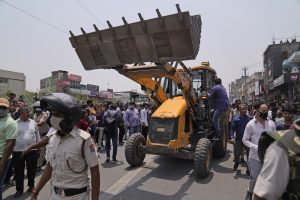Over the last few weeks, the streets in several parts of India’s capital, New Delhi, have been overrun by bulldozers, compelling Delhi Chief Minister Arvind Kejriwal to lash out against the Bharatiya Janata Party (BJP) for carrying out the “biggest destruction in independent India.”
This could have been dismissed as yet another tussle between Kejriwal’s Aam Aadmi Party (AAP) and the BJP, which controls New Delhi, over civic issues, if not for the fact that the BJP declared that the demolition drives were aimed at throwing out illegal immigrants (Muslim) Bangladeshis and Rohingyas from Delhi.
India’s ruling BJP, which is a Hindu nationalist party, has long targeted Muslims, their lives, livelihoods, homes and heritage.
The BJP’s Delhi unit chief Adesh Gupta said that there is “no place for Rohingyas and Bangladeshis” in Delhi, alleging that they foment riots. AAP retorted that if bulldozers were rolled over Home Minister Amit Shah’s house then violence and riots would stop across India on that very day.
The targeted demolitions in Muslim-dominated area like Jahangirpuri and Shaheen Bagh indicate that in the name of civic governance, the BJP is evicting Muslims from the capital. Opposition Congress leader Rahul Gandhi tweeted a picture of a yellow bulldozer alongside a picture of the Indian constitution saying, “This is a demolition of India’s constitutional values. This is state-sponsored targeting of poor & minorities. BJP must bulldoze the hatred in their hearts instead.”
Careful to not alienate Hindus, Kejriwal was initially silent over the demolitions. It was only after AAP’s Muslim legislator Amanatullah Khan was arrested for standing in solidarity with local constituents protesting the demolitions in the area that Kejriwal questioned the BJP’s “bulldozer politics.”
AAP has often been criticized for practicing “soft- Hindutva.” It claims to be secular but appeases India’s Hindu majority. Its record on a number of issues be it the anti-Citizenship Act protests, the communal riots in Delhi in 2020 or even the recent demolitions show its double-speak on communalism.
It is the BJP’s Uttar Pradesh Chief Minister Yogi Adityanath’s successful use of demolition drives against alleged rioters that is inspiring others to copy his strategy.
At rallies during the recent assembly elections in Uttar Pradesh, Adityanath made it a point to have bulldozers placed at the rally site as a show of strength as well as defiance – to hit out at those who criticized his anti-minority policies. In his speeches he repeatedly associated minority Muslims with criminal activities and stressed that his bulldozers were targeting their assets. Adityanath’s popularity soared with the bulldozer symbolism earning him the moniker “Bulldozer Baba.”
It contributed to Adityanath winning a second term despite the strong fight put up by opposition parties. It has prompted the BJP leadership to emulate it elsewhere.
As political commentator Sharad Pradhan observed, the bulldozer is the BJP’s new weapon against Muslims. The bulldozer is “not just as an inanimate object” but “an ‘idea’ meant to cement its hate politics….”
Incidentally, bulldozers rolled into New Delhi’s Jahangirpuri four days after a communal flare-up between Hindus and Muslims in the locality over a religious procession. As one Delhi BJP insider told The Hindu, “You have to understand that everything is happening as per a strategy — in one stroke the BJP has displayed that it is capable of taking tough decisions and will not tolerate lawlessness from any community.”
The BJP is seeking to cement its hold over the unified municipal authority the Municipal Corporation of Delhi in the coming elections.
The BJP’s “demolition politics,” as perfected in Uttar Pradesh, are here to stay.
Already BJP-ruled state governments in Madhya Pradesh and Gujarat have swung into action. In Madhya Pradesh’s Khargone, houses and shops of alleged stone-pelters (mostly Muslims), who were accused of inciting violence during a Hindu festival last month, were demolished. The state government promised to unleash the bulldozer against rioters – setting a dangerous trend of the executive being the jury and executioner too. In Gujarat’s Surat city, the properties of a gangster duo was demolished with police help. Incidentally, Gujarat will vote in assembly elections later this year. In Karnataka, the BJP government is contemplating demolition of properties of riot accused. The state will vote in assembly elections next year.
The BJP and its ideological mentor, the Rashtriya Swayamsevak Sangh (RSS) have always believed in strong-arm tactics and brute force to push forward their agenda.
In 1992, the Babri Masjid in Uttar Pradesh was demolished. This demolition helped propel the BJP successfully into the forefront of national politics. With the Supreme Court finally clearing the way for the majority Hindus to build a temple at the disputed site, the BJP has now moved to the next item on its agenda – the Gyanvapi mosque in Varanasi. Only a demolition of the mosque, it seems, will appease the Hindutva organizations.
In a deeply polarized society, bulldozer politics which instils both fear and awe in the electorate, is a sure route to success.
































